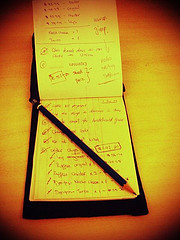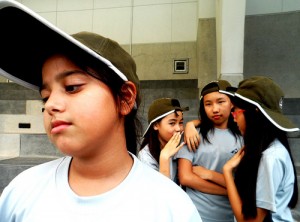Laundry, dishes, fill out forms, write reports, sign a spelling test, read a memo, answer an email, walk the dog, run out for more toilet paper, telephone calls, videoconference, parent-teacher meetings, new product launch, meet a client, gymnastics pickup…
I used to write a lot of To Do lists to keep myself on track. It certainly helped me remember all the minutiae that made up my daily life, but now it just raises my blood pressure. The post-it notes on my desktop mock me. My cellphone chimes so many reminders I’ve stopped listening. Pick up bread! Schedule dental cleanings for the kids! Prepare for a staff meeting! Call Dad!
Sigh. I’m feeling a bit overwhelmed these days. Can you tell?
I know I’m not the only one. One of my oldest, dearest friends posted the phrase I used in my title as her Facebook post this past week. I laughed in recognition, and total sympathy. I think a lot of working parents can identify, since our second work shifts begin when we walk away from our desks (or wherever we work).
The truth is, I kind of also secretly love this frenetic mashup of activity. I love the challenges of my new job, the steep learning curve, the thrill of mastery (and even the agony of getting it wrong but knowing it will be right next time). I love showing my girls that if you are creative and organized and hard-working (and sometimes willing to give up your personal down time), you can thrive on a thousand million overlapping activities. I really feel those are very valuable lessons.
I recognize that I’m fortunate to be working hard at a job I love, when there are plenty of other people seeking work, scraping by or working equally hard at jobs they hate.
Sometimes you can just get into the right groove. A psychologist named Mihály Csíkszentmihályi described the concept of “flow” in an attempt to capture that experience of total absorption in a task, a single-minded immersion, with an energized focus and enjoyment in the process. Emotions are harnessed in the experience of working and learning.
Have you ever sat down to do something only to look up and find two hours have flown by? I’ve totally been there. It’s as the working equivalent of a runner’s high. It’s been described this way: “The hallmark of flow is a feeling of spontaneous joy, even rapture, while performing a task.”
So gratifying when it happens.
But the price to be paid for the life I’ve made myself is the stress of multitasking, of cramming too much in to too small a space of time. I try to fit in a mental health check from time to time to see if I need to step away. Go for a run. Spend an evening watching corny movies with my kids, bake cookies or immerse myself in a good book. And all of this is a delicate house of cards that can fall to pieces if someone gets sick, or the messiness of life throws my balance off-kilter.
That’s how I’m feeling right now. So I’m trying to scale back a bit. I’ve been blogging less often here now that I’m also blogging for work. I’ve also begun turning down speaking engagements that require entirely new prep or research, so I can focus on new position, though I’m always happy to run evening workshops on my most popular existing workshops.
The one place I don’t want to cut back is time with my family. It takes a lot of self-discipline to put away the phone, the computer and the mental distractions about tomorrow’s To Do list. Trying to be in the moment can be a real challenge.
But it’s just as important to model that. Maybe more.
Somehow it will all get done. And those things that don’t maybe weren’t all that important anyway.




